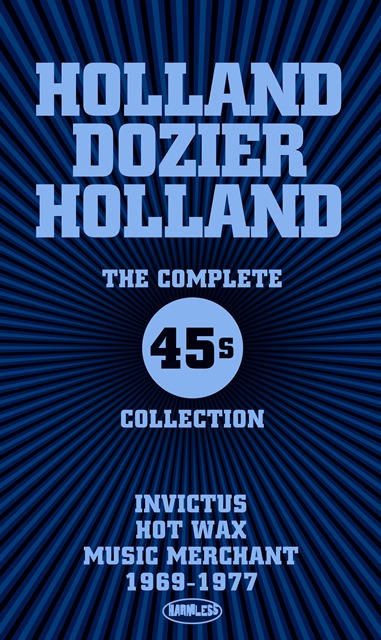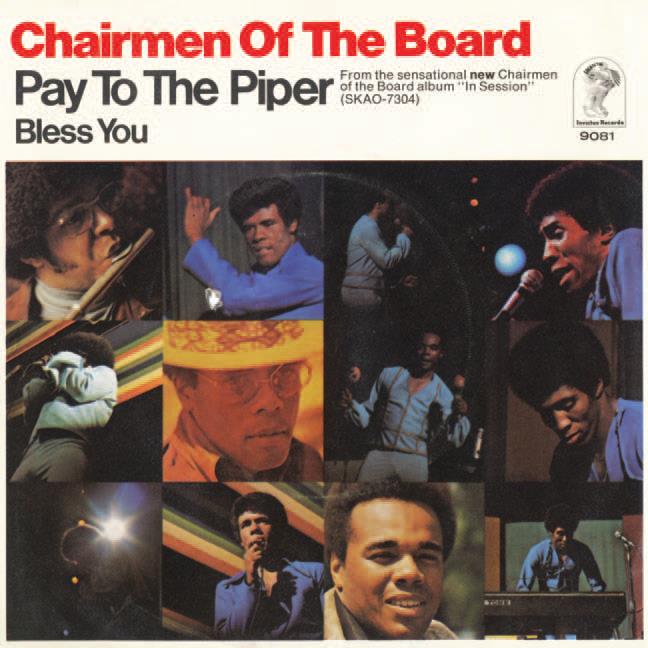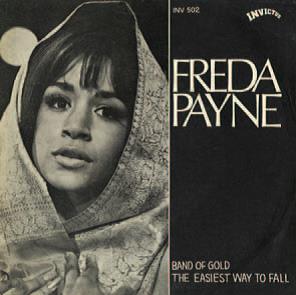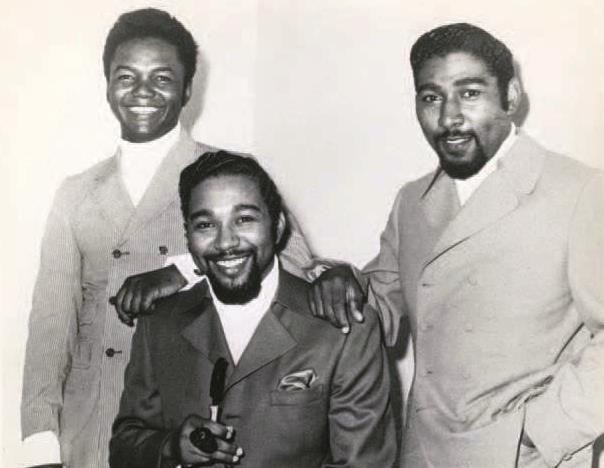 Various Artists: Holland-Dozier-Holland - The Complete 45s Collection, Invictus, Hot Wax, Music Merchant
Various Artists: Holland-Dozier-Holland - The Complete 45s Collection, Invictus, Hot Wax, Music Merchant
As Holland-Dozier-Holland, Lamont Dozier and brothers Brian and Eddie Holland wrote and produced for The Four Tops, Marvin Gaye, The Supremes and every other top-flight Motown act between 1962 and 1968. Their credit was behind “Baby Love”, “Nowhere to Run”, “Reach Out I’ll Be There”, “Where Did Our Love Go” and many other classics. But that wasn’t enough for the trio. At Motown, they increasingly felt, as the book with this package puts it, “overworked and under-appreciated”. Splitting from Berry Gordy’s label, they started their own, Invictus.
Although Invictus and its related labels Hot Wax and Music Merchant never had quite the impact of Motown, the trio almost instantly hit with Chairmen of the Board’s “Give Me Just a Little More Time” and Freda Payne’s “Band of Gold” in 1970. But they couldn’t immediately claim all the credit as contractual wrangles with Motown meant they had to write under the assumed name Edythe Wayne.
This whopping 14-disc box set chronicles their complete post-Motown adventures on single. All the A- and B-sides are collected along with 18 unissued tracks from acetates, alternate versions from test pressings and remixes by Tom Moulton. In all, there are 269 tracks.
 The mainstays of Invictus were Chairmen of the Board, Payne and The Honey Cone. Future weird-funk legends Parliament passed through the label, and The 8th Day and The Glass House scored high on the R&B charts, but Holland-Dozier-Holland (H-D-H) found no new acts to rival the most successful names they had worked with at Motown.
The mainstays of Invictus were Chairmen of the Board, Payne and The Honey Cone. Future weird-funk legends Parliament passed through the label, and The 8th Day and The Glass House scored high on the R&B charts, but Holland-Dozier-Holland (H-D-H) found no new acts to rival the most successful names they had worked with at Motown.
Invictus was not at fault for this. It was more that there was nothing H-D-H – or anyone for that matter – could have done in the early Seventies with a new mainstream-style label (David Geffen’s quasi-independent Asylum aside) to scale the heights of prime-period Motown. As the decade progressed, labels subsumed one another and the music industry became increasingly corporatised. What Motown had done was impossible to repeat.
Listening to this box presents a version of H-D-H’s label as it was never meant to be heard. No one would have sat down and listened to the singles of Invictus, Hot Wax and Music Merchant one after another in order of release. But doing so reveals how hard it must have been for the three label heads to reassert their presence once out there on their own. Narratives emerge.
 The set is at its most fascinating around 1971, when H-D-H were clearly feeling their way. “I’m in Love Darling”, an infectious, imploring solo single by Chairmen of the Board’s General Johnson was followed into the shops by “Old Mother Nature”, an alright sound-a-like of The Band by Lucifer. Like The Band, they had ties with Ronnie Hawkins, but this was a sore thumb for the label and was never going to find an audience on this label. Whatever H-D-H may have been thinking with this single, they quickly abandoned notions of pursuing rootsy white rock. Further evidence for their unsureness comes wiith the two curious singles sandwiched between Freda Payne’s funky “You Brought the Joy” and Chairmen of the Board’s Temptations-ish “Men are Getting Scared”. Johnn (sic) Billy West’s “Nothing But a Devil” was a very dated soul ballad sounding as though it's from 1963 and Billie Sans’s “Solo” was weedy harpsichord-punctuated bubblegum-pop. More strike outs.
The set is at its most fascinating around 1971, when H-D-H were clearly feeling their way. “I’m in Love Darling”, an infectious, imploring solo single by Chairmen of the Board’s General Johnson was followed into the shops by “Old Mother Nature”, an alright sound-a-like of The Band by Lucifer. Like The Band, they had ties with Ronnie Hawkins, but this was a sore thumb for the label and was never going to find an audience on this label. Whatever H-D-H may have been thinking with this single, they quickly abandoned notions of pursuing rootsy white rock. Further evidence for their unsureness comes wiith the two curious singles sandwiched between Freda Payne’s funky “You Brought the Joy” and Chairmen of the Board’s Temptations-ish “Men are Getting Scared”. Johnn (sic) Billy West’s “Nothing But a Devil” was a very dated soul ballad sounding as though it's from 1963 and Billie Sans’s “Solo” was weedy harpsichord-punctuated bubblegum-pop. More strike outs.
It’s also intriguing to hear how individual artists were rolled out before the listening public. Payne’s extraordinary “Band of Gold” (how many other pop sings deal with an unconsummated marriage so directly?) was followed by “Deeper and Deeper”, which filches the rhythm of 1969’s final Diana Ross-era Supremes single “Someday We’ll Be Together”. Next up from Payne was “Cherish What Is Dear to You” which is this-close to the early Jackson 5 (she’s a ringer for Michael Jackson - listen to it overleaf), who hit big with Motown (also in) 1969. They may have left Gordy’s label, but Motown was still on H-D-H’s collective mind.
More narratives crop up as the set progresses – H-D-H finally claimed their label for the public eye in 1973 by recording under their own name; they had an uncomfortable relationship with disco.
Overall, this is an important collection bringing together a vital body of work by one of America’s most significant musical teams. Well packaged, with a good-looking book and keenly priced at £60, this, like the recent Vee-Jay box, contrasts strongly with no-frills major-label boxes which suggest that the music is being devalued.
Overleaf: listen to Freda Payne's “Cherish What Is Dear to You”















Add comment